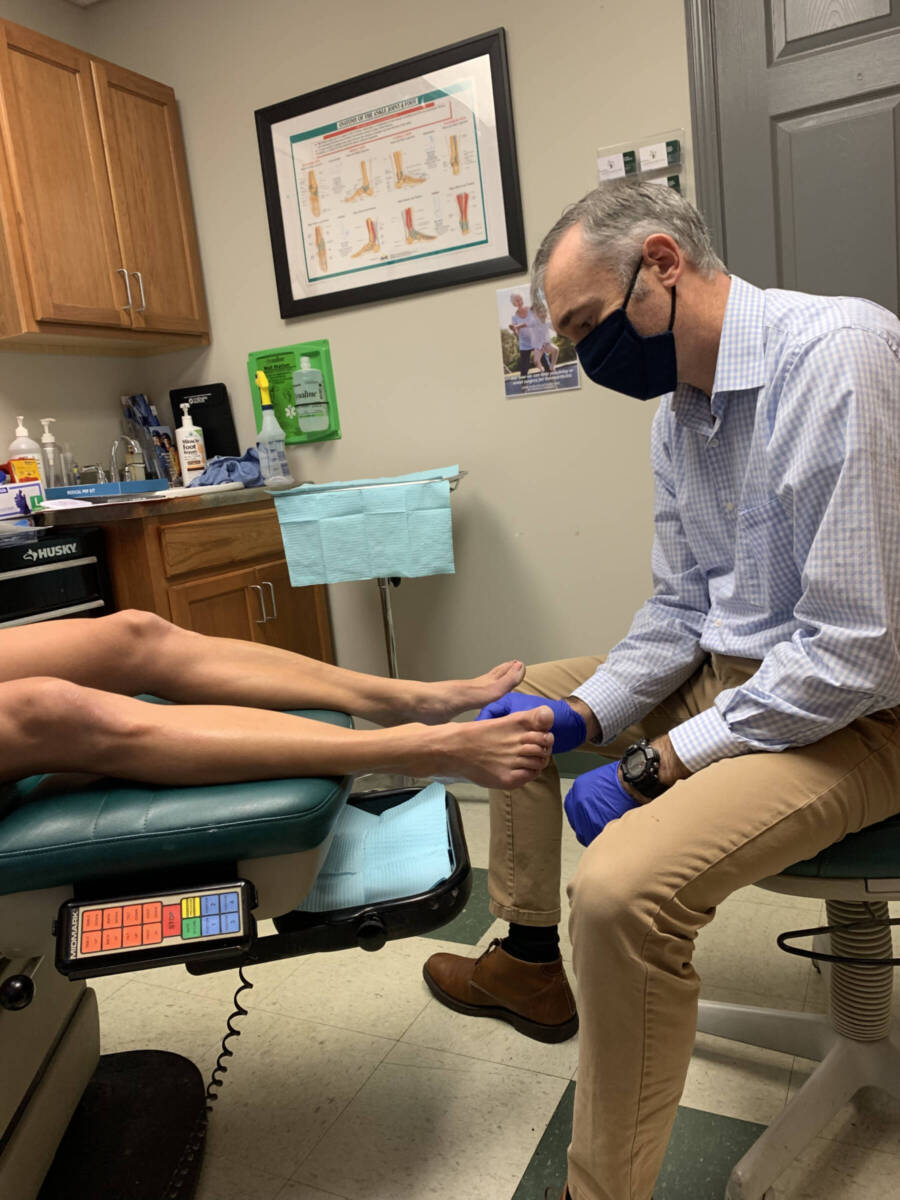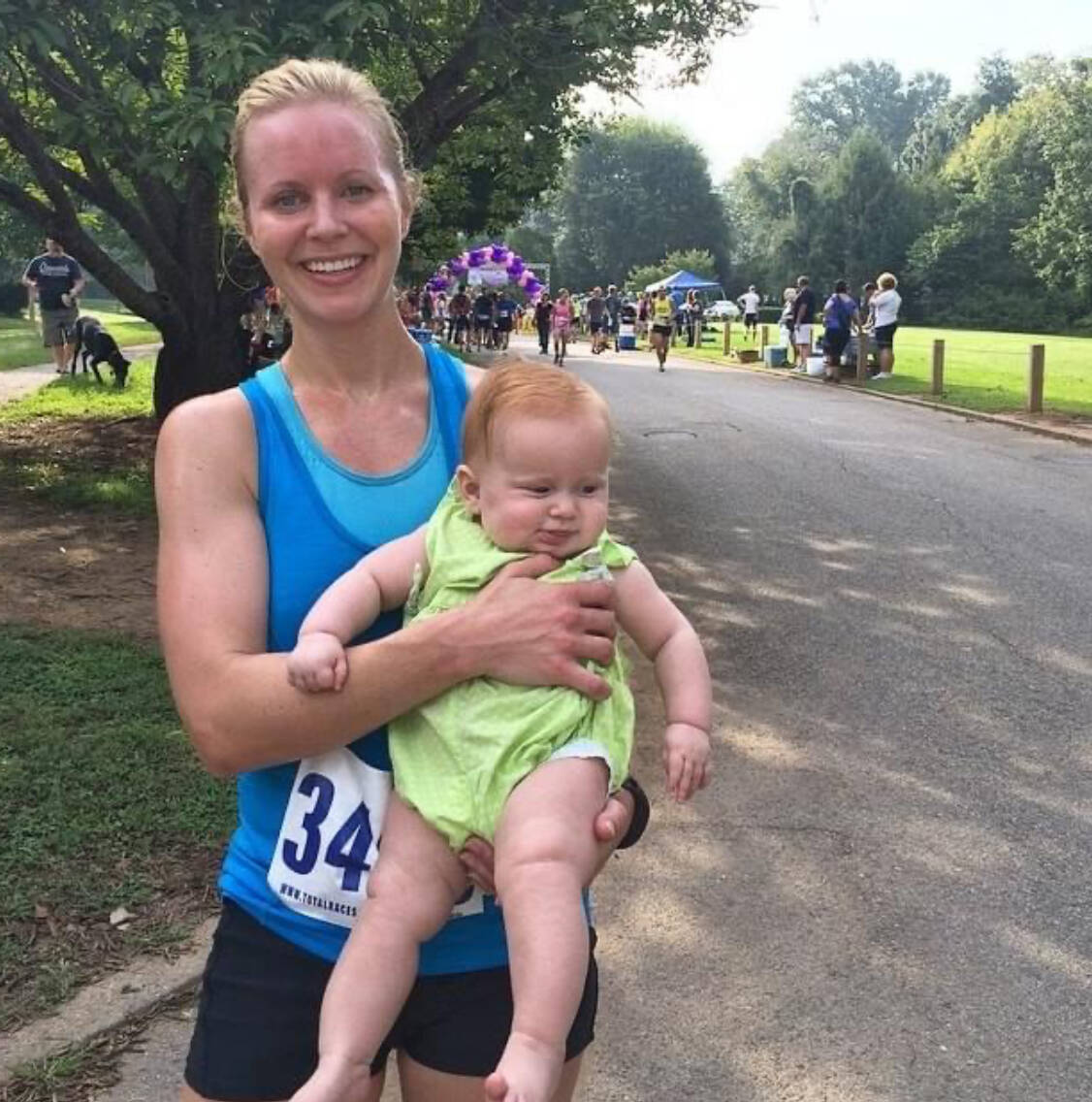How to Cope with a Running Injury
The last several years I have suffered three major running injuries that left me sidelined for 6 months or longer. I’ve learned each time how to deal with a running injury and cope with injury depression.

In 2019, I tore my hamstring in a single attempt to try to qualify for the Olympic Trials Marathon. It took more than a year to rehab. I was only back for a few months before I tore my plantar fascia requiring more than a half of a year completely off running. Then I came back for a year, running PRs in the mile (5:16 at the end of a workout), half marathon (1:20), and marathon (2:54). I thought I had put my running injuries days behind me… A few months later, I stopped running due to hip and thigh pain. After six weeks off, I was finally able to get an MRI which confirmed that I have a torn labrum.
Dealing with a sports injury is really confusing and equally devastating. Running is crucial for physical health as well as mental health.
Battling post-injury depression
For a week, I moped around saying “all my dreams are dead.” I had pretty big goals for a 42-year-old mom: a 2:45 marathon, break 5 minutes in the mile, and run until the day I die.
As much as I love running, I love chasing down big goals. Just running a few easy miles on days my body will allow me doesn’t satisfy me and it’s not something I am going to settle for. Even if naysayers (non-runners) tell me I need to give up running or that I adjust my goals. Instead, I am adjusting my path to these goals. And I coped with my injury, reframed it as a career extender, not allowed age to be a ceiling, and commited to doing whatever it takes to heal.
I know being an injured runner blows. It takes more of a toll on your mental state and emotional well-being than physical toll in many ways. If this is your first time dealing with a running injury, below are strategies that have helped me through each long layoff. I hope they help you, too.
Here goes….
10 Top Tips to Cope with a Running Injury
1. Feel the feelings.
Step one of coping with a running injury or sports injury is to embrace the feelings of helplessness and hopelessness. Yes, step into the negative emotions and nasty thoughts such as: this sucks, why me?, this is unfair!, I’ll never run again, my dreams are dead (that’s my go-to according to my kids), I’m unraveling, etc. It’s also okay to be angry…This time around, I was really angry with my body.
I felt like I gave it everything it needed to recover and be strong, and it still broke. For a period, any gratitude for what it’s allowed me to do—run long distances, have children, move freely—was eclipsed by the feelings of ire and betrayal.
Also, let go of the guilt that you’re silly to feel this way when it’s just a hobby and you’re not dying. That held me back from mentally healing when dealing with my hamstring injury. I felt so bad for feeling so bad.
2. Know it’s not your fault.
While you’re at it. STOP BLAMING YOURSELF. So many injured athletes fight negative thoughts of shame–blaming themselves for what happened to them. Injured runners often get blamed by others who don’t understand. Frankly, it’s infuriating. Please don’t tell me I did too much or just need to take time off—or God, forbid…Find another sport.
I am quick to tell people that I do everything right to recover well from my hard work—sometimes it’s just bad luck. I also tell people that I am challenging myself and this is part of the process. This is true. Running is a high-impact repetitive sport so any little imperfection will get magnified over time in the form of a physical injury. It’s part of it but the benefits of running far outweigh this negative.
Stepping into bad feelings and fears (such as I’m going to lose all my fitness and never be able to come back!) allows you to move past them. Research shows this and so do countless experiences of people I know…and myself.
Remember its part of the journey that happens to most athletes. Think of a runner you admire. Chances are they battled sports injuries. Growth comes from challenges.
3. Go dark on data.
I stay away from numbers including heart rate, VO2 Max, Garmin race predictor, hours exercised, and weight. All these numbers can exacerbate the feelings that you’re falling behind and falling apart.
Personally, I don’t follow what others are doing on Strava or social media (particularly those who would have been my “competitors”) because that CAN feel like salt in the wound. I am happy for them and their fitness, but it just makes me feel worse so I stay away.
If you are one of those people, sorry for the lack of kudos and likes during this period! It’s self-preservation!
When it comes to weight, I fear weight gain during injury—and I definitely gained weight during my 1.5 years away from running due to my hamstring injury. I feel like it sounds trivial to say—but it made me feel less like myself, less like an athlete, further making me far away from my sense of self. It’s important to remember that food is fuel, even if you aren’t running. It’s not something for you to control. Your body needs it to function.
If you need help managing your relationship with food while injured, I suggest connecting with a therapist and/or registered dietitian. (I am happy to suggest some, too!).
4. Embrace a new routine.
One of the major benefits of running or whatever sport you enjoy is the shape of days it gives you. Aim to replace your workout routine with physical activities that you CAN do (and helps recovery). Ideally, you can find something that scratches your itch close to how running does.
While in the space of the unknown with my labral tear, I got on the Alter-G anti-gravity treadmill as much as I could. I would try to do a long run and speed workout days to mimic my training. This helped mentally avoid the feeling that I was losing all fitness and turning into a blob.
When my regenerative medicine injections start, I cannot do weight-bearing exercises, so I plan to lean into what I could do—swimming and aqua jogging. While I don’t love these cross training exercises, I plan to learn to love them as something I can do to help my recovery (as well as physical therapy exercises).
Logging your progress toward recovery can help you feel less aimless and give your days purpose like running used to. So feel free to journal them or post on Strava if this helps you feel more productive.
5. Work on weaknesses (mental and physical).
This time off of running can be an opportunity to focus on weaknesses—physically and mentally. Surely, your physical therapist may have told you your right glute needs to be strengthened or you should do more core work. But along with that, peer into your brain and think about what else needs work.
Personally, I am working on strengthening my pelvic floor and right glutes. Training-wise, I hate tempos, so I did lots of them on the alter-G.
We can all work on that mental toughness muscle. For me, I need to focus on taking one mile at a time. Being zipped into the anti-gravity treadmill for hours at a time, with nothing but its screen to look at, no fan, having to pee while its compressing against my bladder, and running out of fluids, is doing that for me. While I can easily think about how the situation sucks…and I should be outside running in the fresh air and sunshine, chatting with my friends…I lean into the discomfort. And I think about how it is making me stronger…and more grateful.
Being injured is also helping me work on my pervasive weakness of inflexibility. I hate it when running plans don’t go as prescribed. This whole process forces me to learn how to adapt to challenges on the fly which is something champions know how to do.
6. Stay connected.
As much as seeing others healthily run can hurt and you may want to fully withdraw from the sport, I urge you to stay connected with those close to you in the running community. You know, keep connected with your “friends.” Ask them how they are doing. Tell them how you are doing. For many, the social interaction from running is just as worthwhile as the act itself. Indeed, my closest friends are my running friends.
Go to a race if you can and are mentally ready to. Doing this can help you forget that you can’t run and focus on the beautiful gifts running can give people of all abilities. I know it may feel like the last thing you want to do, but it actually helps you move into a more positive space and recognize that running is a gift not a right.
Also, it you have an injured friend, check in with them right now! Being injured is really isolating so it means more than you know!
7. Don’t make plans…yet.
It can be so tempting to adhere to the timeline your medical team speculated and start plotting races and race time goals. But in my experience, that only sets you up for disappointment. Now is the time to be specific in recovery goals and vague with running goals. Keep them there to keep the fire alive but hold them loosely until you are further into your healing process.
Instead, focus on short-term goals for your recovery such as being able to walk with minimal pain or doing your physical therapy exercises every day. These little goals can be embedded in the over-arching goal which is likely to run healthy or run for the rest of your life.
Also, beware of secret goals. This is a notion highlighted in the book Rebound. Secret goals are goals you only know that may derail your training. For example, you may think you’ll return to running in two months when your health care provider says it’ll take three months. This thoughts can lead you to overdoing or underdoing your training, setting you up for setbacks—and elongating your recovery process.
8. Reframe your identity.
Not being able to run stings no matter how many times I’ve dealt with it. Running is part of my identity. I’ve done it for almost forty years and therefore have always been known as a runner—at school, at work, by my friends, neighbors and family. I built my career around running as a running coach, blogger, podcaster, and “influencer.” I love running!!! Always have!!! So I can’t hide from it even if I am not able to do it.
Leaning into other parts of your identity may help you fill the void while you’re on the sideline.
I know that I am more than running and my self-worth isn’t hinged on how far or fast I can run. Yes, yes, I know, I know. Still, I find it is helpful to still identify with running but in a different way. I will call myself an “injured runner” and step into what that means: I am working on recovery to get back to doing what I love. It reinforces that it’s temporary. Personally, it also allows me to embrace more helping others as a coach and within the running community.
(Funny thing: to give myself something to look forward, I am redoing my kids’ rooms. With all he boxes being delivered, the FedEx delivery asked what was going on–my husband quipped that his wife is an injured runner. No more needed to be said.)
9. Tap into injured athlete resources.
There are plenty of resources out there to help you navigate being an injured runner and feel less alone. When reading Rebound, I think I nodded my head the entire time. It’s uncanny how similar experiences, feelings, and struggles of being an injured athlete are. We are not alone in coping with injury depression and all it comes with.
Resources for injured athletes that have helped me are:
- The Injured Athlete Club including Facebook group and podcast
- the book Rebound by Cindy Kuzma & Carrie Jackson Cheadle who host the Injured Athlete podcast
- Sidelined USA for those struggling with athletic injury loss, and
- Matt Fitzgerald’s Comeback Quotient.
Big thanks to one of my athletes, Carrie Eichmann, who is a sports psychologist, for her suggestions here! I also find sharing about my personal experiences on social media gives me emotional support in a way I couldn’t have predicted. You people understand!!!!
By the way, Cindy Kuzma interviewed me on this topic for an article in SELF Magazine which has other amazing tips. Check it out here!
10. See the silver linings.
As much as I would have loved to be able to run seamlessly and conquer all my goals, I wouldn’t trade being injured. That sounds crazy, right? But truly, being injured has given me many gifts including gratitude and joy for when I can run.
It’s also allowed me to become stronger mentally and physically. I also believe being injured has helped me be a better, more compassionate running coach. I understand how to approach niggles before they turn into full-blown injuries, how to come back from injury, and the mental blow it is when you are sidelined.
Not running has also opened up more opportunities for spending time with my family instead of running, more flexibility with our travel schedules, and the ability to sleep in! I remind myself that I will get back to the grind and miss the mornings I don’t have to set my alarm for o’dark’thirty. (Oh, and it’s allowed me to do more house projects, too!).
I also remind myself that getting injured is part of the journey of being a runner. Most runners battle an injury at some point in their career. And most, even an elite runner and other professional athletes will say that it gave them both grit and gratitude.
That said, if you are still coping with injury depression, including pervasive symptoms of depression, you may need professional help. Reading a running blog likely will not be enough. Consider seeing a mental health counselor or sports psychologist, joining a support group, or taking an anti-depressant medication to help you cope with your running injury better.
I could write so much more on this topic, but I will stop there. I would love to hear about your experience with running injuries.






